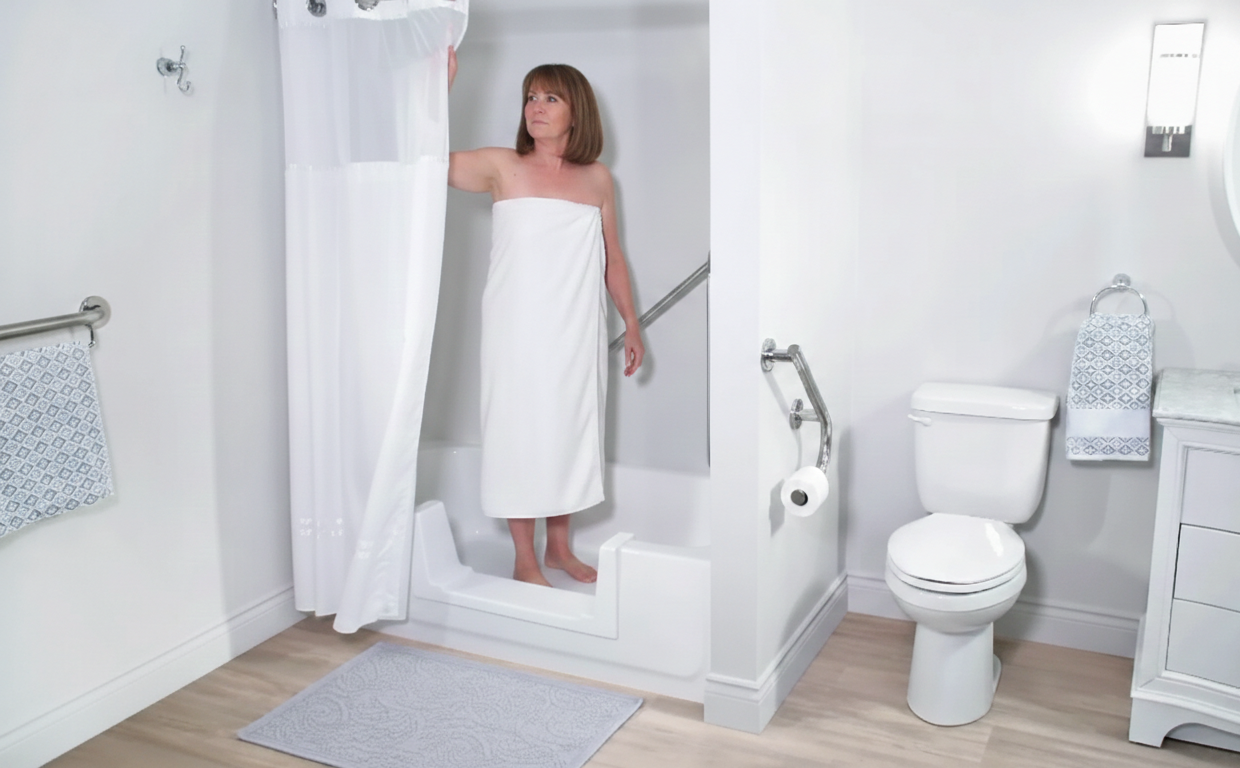What does it really mean to age in place? For most older adults, it’s more than staying in a familiar house. It’s about keeping independence, safety and dignity in everyday life. And while many people think first about ramps, grab bars or wider doorways, one of the most important parts of aging in place is often overlooked: the bathroom.
Bathing is a private routine we all take for granted, but for seniors, it can become one of the hardest daily challenges. Limited mobility, fear of falling or even the idea of needing help with such a personal task can turn a simple shower into a source of stress. That’s why privacy and safety in the bathroom aren’t just conveniences, they’re central to maintaining self-worth and quality of life.
In this post, we’ll explore why privacy matters so deeply as we age, the hidden struggles behind senior bathing and the solutions, from bathroom safety upgrades to caregiver strategies, that make it possible to keep dignity at the center of daily care.
Aging in Place: What It Really Means
Aging in place is a simple idea with a lot of meaning behind it. At its core, it’s the ability for older adults to live in their own home safely and comfortably as they grow older. Instead of moving into a facility, the goal is to create an environment where independence can last as long as possible.
It’s no surprise that this matters to nearly everyone. Home is familiar, filled with memories and often feels like the safest place to be. Beyond comfort, there are practical reasons driving this trend, too. Rising costs of senior care, long waiting lists at nursing homes and the desire to stay close to family and community all make the idea of aging at home even more appealing.
But here’s the important part: aging in place isn’t only about staying in a house. It’s about maintaining the daily routines that make life feel normal and dignified. That means looking closely at spaces like the bathroom, where privacy and safety often matter most. Bathing may seem like a small detail, but it’s often the difference between feeling independent versus feeling dependent.
Bathing: More Than Just Getting Clean

Bathing might seem like a simple daily task, but for seniors, it’s much more than just staying clean. It’s a cornerstone of health, independence and confidence.
Keeping the skin clean and healthy helps prevent infections, irritation and other medical issues. A warm, safe bath or shower can also lift the mood, offering a small but powerful sense of control and comfort at the start or end of the day. When seniors feel fresh and confident, they’re more likely to engage with others.
At the same time, bathing can become a major challenge. Physical limitations, fear of slipping or needing help with tasks that used to be simple can make a routine shower feel stressful. These moments can touch on a person’s sense of dignity, making it harder to enjoy independence. That’s why creating a bathroom environment that is safe, private and respectful isn’t just a convenience. It’s really important for maintaining confidence and quality of life.
Why Privacy Matters in Bathing
Privacy in the bathroom isn’t just about closing a door—it’s tied to independence, dignity and mental well-being. For many seniors, being able to manage personal care on their own terms reinforces a sense of control over life, even as other areas may feel less predictable.
When privacy is lost, it can affect more than just comfort. Relying on assistance for such personal tasks can create feelings of vulnerability or embarrassment. That loss of control can ripple into emotional health, sometimes leading to stress, frustration or even depression.
Maintaining independence in bathing, even in small ways, makes a big difference. Simple steps (like letting a senior wash parts of their body they can manage themselves, using modesty coverings or ensuring a safe, private environment) help preserve confidence and self-respect.
Creating a space where seniors feel safe and private not only protects their dignity but also supports overall mental health. When independence is respected, everyday routines become empowering rather than discouraging, turning bathing into a moment of self-care rather than a challenge.
The Psychology Behind Bathing Resistance
Bathing can become more than a routine. It can feel like a hurdle for many seniors. Understanding why helps families and caregivers approach the situation with empathy and practical solutions.
There are several common reasons older adults resist bathing:
-
Fear: Slipping or falling in the shower is a real concern. The thought of losing balance or getting hurt can make even a quick bath feel risky.
-
Desire for Control: Bathing is deeply personal. Choosing when, how and with what assistance to bathe is a way to maintain independence. Resisting help is often a way to assert that control.
-
Pain or Discomfort: Arthritis, joint stiffness or other physical limitations can make movements painful. The effort required to get in and out of a tub or bend safely can be exhausting.
-
Low Motivation or Depression: Changes in mood or energy levels can make routine tasks like bathing feel overwhelming or unimportant.
-
Cognitive Changes: Memory issues, sensory sensitivity or confusion can make the process harder to remember or tolerate.
Recognizing these reasons is key. Bathing resistance is rarely about stubbornness. It’s usually a mix of fear, discomfort and the desire to remain independent. Addressing these concerns with patience, safety and privacy can turn bathing from a stressful task into a manageable, even empowering, part of daily life.
From Struggle to Support: Helping Loved Ones Bathe with Dignity
Helping seniors with bathing doesn’t have to be stressful. With the right approach, it’s possible to maintain privacy, safety and independence at the same time. Here are practical ways to make bathing a more comfortable experience:
-
Create a Routine, Not a Rule: A predictable schedule can really help seniors feel more in control. Ask for input on timing instead of setting strict rules, which can reduce resistance.
-
Offer Choices, Not Commands: Let seniors decide aspects of their bath—temperature, order of washing or whether to use a shower or tub. Small choices reinforce independence.
-
Encourage Partial Independence: Support them in washing what they can manage themselves. Long-handled brushes, bath sponges or shower chairs can make this easier.
-
Use Modesty Solutions: Towels, bath blankets or strategically placed covers protect privacy while still allowing effective bathing.
-
Keep Communication Light and Friendly: Gentle conversation or small distractions can ease anxiety and make the process feel normal rather than clinical.
-
Consider Professional Assistance When Needed: Trained home health aides can offer support while maintaining dignity, especially when safety or mobility is a concern.
With these strategies, bathing can become a cooperative and respectful part of daily life, helping seniors maintain confidence and caregivers provide care without stress.
Elderly Bathing Solutions: Designing Bathrooms That Protect Privacy

The bathroom can be one of the most challenging spaces for seniors, but it’s also one of the most important when it comes to maintaining independence and dignity. The right design and tools can make a huge difference, letting seniors take care of themselves safely and confidently.
Here are key upgrades that help create a bathroom for seniors that supports privacy and independence:
-
Walk-In Tubs and Showers: Eliminating high steps reduces the risk of falls and makes entering and exiting easier. Products like Quick Tub offer solutions designed specifically for safety, comfort and privacy.
-
Grab Bars and Non-Slip Mats: Strategically placed grab bars and non-slip mats provide support where it’s needed most, allowing seniors to move with confidence.
-
Shower Chairs and Handheld Showerheads: Shower chairs give a stable seat for bathing, and handheld showerheads make it easier to wash independently, even when mobility is limited.
-
Better Lighting and Wider Doors: Good lighting reduces the risk of accidents, and wider doors make the bathroom accessible for walkers, wheelchairs or caregivers if help is needed.
These upgrades do more than prevent accidents. They restore a sense of autonomy. When seniors can safely manage their personal care, privacy is preserved and daily routines feel empowering rather than stressful. A thoughtfully designed bathroom can transform bathing from a challenge into a moment of independence and self-respect.
Quick Tub offers a practical, safe and affordable way to make your bathroom more accessible without a full remodel, helping seniors age in place with confidence and comfort. Explore tub conversion kits today to invest in both safety and dignity.
FAQ Section
Why is privacy so important to humans?
Privacy isn’t just a comfort. It’s connected to independence and self-respect. For seniors, having control over personal routines like bathing helps maintain confidence, emotional well-being and a sense of dignity. Losing privacy can feel like losing control, which is why small adjustments to protect it can make a big difference.
What is a dignity bathing garment for the elderly?
These are specially designed garments that allow seniors to bathe safely while remaining covered. They provide modesty and comfort, helping maintain independence and self-esteem during a task that can otherwise feel vulnerable.
What is the recommended approach when bathing a patient to maintain their dignity?
The key is respect and choice. Allow seniors to wash themselves as much as possible, use towels or bath blankets to cover areas not being washed and communicate gently. Creating a calm, private environment helps the process feel safe rather than stressful.
What happens if an elderly person doesn't bathe?
Skipping baths can lead to skin infections, irritation and hygiene-related health issues. Beyond physical health, it can affect mood, confidence and social engagement. Finding solutions that make bathing safe, comfortable and private is essential for overall well-being.



Share:
Update on U.S. Shipment Delays
Shipments to the U.S. Moving Without Issue